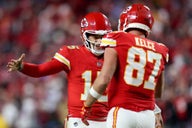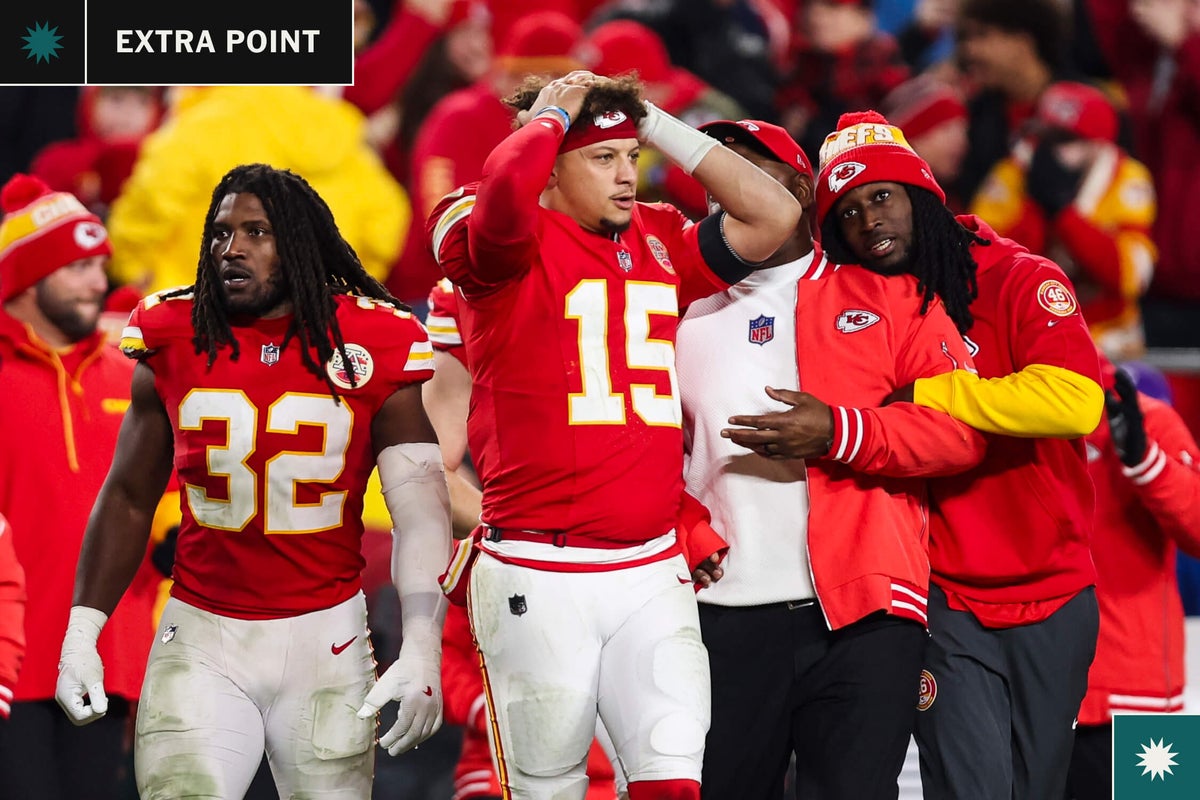The Kansas City Chiefs keep winning games no team should win so frequently, leaving opposing fans pointing to everything from dumb luck to favorable officiating to explain the maddening inevitability.
Mathematically, the Chiefs’ 15-game winning streak in games decided by one score or less should happen once in 406 chances.
With a 19-17 victory over the Los Angeles Chargers on a last-second field goal that bounced off the left upright before clearing the crossbar Sunday, the Chiefs became the 26th team in league history to begin a season with a 12-1 record.

GO DEEPER
How Patrick Mahomes, Chiefs pulled off another magic act, complete with a doink
Yet, they are one of one.
The Chiefs’ point differential through 13 games (plus-56) is by far the smallest for any 12-1 team.
The victory over the Chargers was Kansas City’s fourth of the season by one or two points, a total exceeded just once over a full season in the 105-year history of the NFL. The 1989 Green Bay Packers did it five times and finished 10-6, per Pro Football Reference.
How do the Chiefs keep doing this? What is their secret? This specific Kansas City team appears configured to play many close games and win a higher percentage of them, even if the current 15-game win streak in one-score games remains a mathematical outlier, as we’ll demonstrate next.
What will it mean in the playoffs? There are indicators to consider there as well.
The odds behind the streak
The Chiefs have an 18-1 record since Week 17 of 2023, counting their four-game run to a second successive Super Bowl victory. That period includes the 15-game victory streak in games decided by eight or fewer points. The Chiefs have also won by 19, 13 and 10 during that span, while suffering their only defeat, 30-21, at Buffalo on Nov. 17.
To calculate how likely a team would be to win 15 consecutive games of any kind, we take the team’s expected win rate in those games to the power of the streak duration. Counting playoffs, the Chiefs had a 42-21 (.667) record in one-score games from 2018-23 with Patrick Mahomes as their starting quarterback. I used this rate to plot Kansas City’s expected wins across 15 such games.
The table below shows the likelihood of a team winning between one and 15 games consecutively with projected win rates of 67 percent (Mahomes’ win rate in one-score games from 2018 to 2023) and 78 percent (his win rate in 2023-24).
| Games in Streak | 67% Win Rate | 78% Win Rate |
|---|---|---|
1 | 66.7% | 78.3% |
2 | 44.5% | 61.3% |
3 | 29.7% | 48.0% |
4 | 19.8% | 37.6% |
5 | 13.2% | 29.4% |
6 | 8.8% | 23.0% |
7 | 5.9% | 18.0% |
8 | 3.9% | 14.1% |
9 | 2.6% | 11.1% |
10 | 1.7% | 8.7% |
11 | 1.2% | 6.8% |
12 | 0.8% | 5.3% |
13 | 0.5% | 4.2% |
14 | 0.3% | 3.3% |
15 | 0.2% | 2.5% |
The microscopic 0.246 percent likelihood of a 15-game streak in the left column works out to a 1-in-406 chance.
It’s historic. Is it unfathomable?
There are ways to demystify the achievement.
The 67 percent win rate creates an expectation that the Chiefs would win 10 of these 15 games. In that case, no one would be shocked if they won a couple fewer or a couple more. Let’s say they happened to win 12.Throw in some one-off occurrences, such as Kansas City blocking a last-second field goal against Denver in Week 10, and the remaining three victories might be explained. An unlikely scramble here, a fortunate penalty there.
But there’s more to it than that.
Perceptions of Chiefs heighten our disbelief
The Chiefs win so frequently and at such a high level, including in the past two Super Bowls, that even the betting markets seem surprised when they do not dominate on the scoreboard.
Point spreads can be instructive here.
The Chiefs are 6-1 over their past seven games without covering the spread even once, per TruMedia.
Since 2000, 21 other teams have gone exactly seven consecutive games without covering. They combined for an 18-129 (.122) record during those streaks. That’s 6-1 for the Chiefs, 18-129 for everyone else.
It’s another way to feel as though the Chiefs are underperforming even when they win, which invites questions about their legitimacy, even though they aren’t the ones setting the expectations.
Winning without impressing might be a Kansas City phenomenon.
The 2020 Chiefs went 5-0 over a five-game stretch without covering the spread, the only team to accomplish that feat since 2000. The 2018 Chiefs own the second-best record since 2000 (3-3) among teams that failed to cover for six straight games.
Nothing seems to come easily for these 2024 Chiefs.
Their rate of explosive plays — defined as rushes gaining 12-plus yards and passes gaining more than 15 — has plummeted to 8.5 percent this season. That ranks 30th, ahead of only the Las Vegas Raiders and New York Giants, who have 2-11 records. The rate is down from 10.5 percent last season, which ranked 16th, and barely half what it was in 2018 (15.7 percent, which ranked second).
Kansas City nonetheless ranks eighth in offensive EPA per play because the Chiefs have shown great ability to sustain long drives, partly because Mahomes ranks first in EPA per pass play on third and fourth downs (he’s 24th on early downs). The Kansas City defense, which has slipped to 18th in EPA per play this season after ranking fifth in 2023, ranks 25th in turnovers forced (10) this season and 27th over the past three.
Longer, more laborious drives by the offense, combined with a defense that plays pretty well in general but does not take the ball away with frequency, could explain why games involving the Chiefs have fewer total possessions than games involving any other team but the Arizona Cardinals this season.
With fewer possessions, each one becomes more valuable, which also could play into Kansas City’s advantages.
Why the Chiefs win so many close games
Reconciling the Chiefs’ 12-1 record with their plus-56 point differential would be difficult without accounting for the roles elite quarterbacks and coaches might play.
Most teams with point differentials near the Chiefs’ plus-56 would have records near 8-5 through 13 games.
The Chiefs are one of seven teams since 1970 with 10-plus wins through 13 games despite having point differentials between plus-51 and plus-61, per Pro Football Reference.
| Team (Pt Mgn) | Record | Notable |
|---|---|---|
 2024 Chiefs (+56) 2024 Chiefs (+56) | 12-1 | HOF HC/QB* |
 2003 Patriots (+60) 2003 Patriots (+60) | 11-2 | HOF HC/QB* |
 1978 Rams (+52) 1978 Rams (+52) | 10-3 | |
 2021 Packers (+56) 2021 Packers (+56) | 10-3 | HOF QB* |
 2015 Broncos (+56) 2015 Broncos (+56) | 10-3 | HOF QB |
 1981 Cowboys (+58) 1981 Cowboys (+58) | 10-3 | HOF HC |
 2003 Eagles (+59) 2003 Eagles (+59) | 10-3 | HOF HC* |
* Likely future HOFer |
Six of the seven had Hall of Fame-caliber quarterbacks and/or head coaches: Tom Brady and Bill Belichick with the 2003 New England Patriots; Aaron Rodgers with the 2021 Packers; a broken-down Peyton Manning (backed by an elite defense) with the 2015 Denver Broncos; Tom Landry with the 1981 Dallas Cowboys; Andy Reid with the 2003 Eagles; and, of course, Mahomes with Reid on these Chiefs.
Kansas City also has a consensus top-five defensive coordinator in Steve Spagnuolo.
These advantages could tip game outcomes when the margins for winning are smallest.
Mahomes in particular is a master scrambler throughout games and especially in critical moments. His scramble rate jumps by about 50 percent in the fourth quarter of one-score games (9.8 percent, compared to 6.5 percent in all situations).
Scrambles for gains of 10 yards against the Chargers on Sunday and 33 yards against Carolina in Week 12 moved the Chiefs into field-goal range during drives that ended with walk-off kicks. Last season, while protecting a 23-20 lead against the New York Jets, Mahomes scrambled 25 yards on third-and-23 to help the Chiefs run the final 7:24 off the game clock with a 15-play drive.
The chart below shows the EPA he has added over the 2023 and 2024 seasons, counting playoffs, on scrambles in the fourth quarter and overtime when no more than eight points separated Kansas City from its opponents on the scoreboard. Mahomes is so much more prolific than others, he’s almost off the chart.
A league-leading seven of these scrambles added at least 5 percent to the Chiefs’ win probability, per Next Gen Stats.
While some critical officiating calls have helped the Chiefs win close games recently, including a pass-interference call against Cincinnati on fourth-and-16 in the final minute in Week 2, Kansas City ranks only 15th in penalty EPA per game in fourth quarters of one-score games over the past two seasons. Seattle has benefited the most and Cleveland the least in these situations.
The Chiefs, despite having recent turnover at kicker, have made all 18 field-goal tries in the fourth quarter of one-score games over the past two seasons. Their average kick distance in these situations is the sixth-shortest in the league (35.2 yards), probably because Mahomes and the offense do such a good job getting into position. Cincinnati, by contrast, averages a league-long 46.4 yards on these kicks.
The smallest things can make the biggest differences in the most critical situations.
What it means in the playoffs
Before the Chiefs, the 1976 Oakland Raiders owned the distinction as the 12-1 team with the lowest point differential (plus-89). That Raiders team won the Super Bowl, but only after overcoming a 21-10 deficit in the fourth quarter to beat New England in the first round of the playoffs. Oakland got a 1-yard touchdown pass from Ken Stabler in the final 10 seconds to win 24-21 after officials controversially flagged the Patriots for roughing the passer on a third-and-18 incompletion. Not too difficult to imagine Kansas City pulling off something similar, is it?
We might also revisit that list of teams that were 10-3 or better through 13 games, but with point differentials similar to Kansas City’s this season.
Those 2003 Patriots and 2015 Broncos won the Super Bowl. The 1978 Rams and 1981 Cowboys reached the NFC title game. The 2021 Packers lost in the divisional round. The 2013 Eagles lost in the wild-card round.
The Chiefs’ ability to win so many close games is a leading reason Kansas City has a league-best 78 percent chance to secure a first-round playoff bye and home-field advantage in the playoffs.
That means Kansas City probably needs to win only two playoff games to reach another Super Bowl.
What’s a two-game winning streak for a team that has won 15 one-score games in a row?
(Photo: Perry Knotts / Getty Images)

The story of the greatest players in NFL history. In 100 riveting profiles, top football writers justify their selections and uncover the history of the NFL in the process.
The story of the greatest players in NFL history.
Buy

